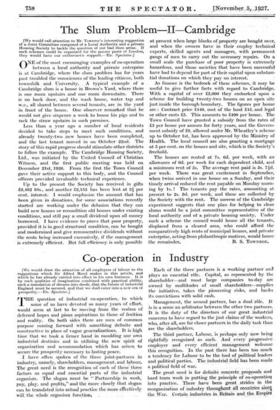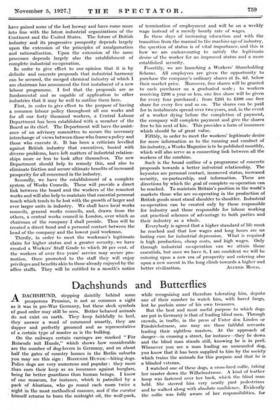Co-operation in Industry
[We would draw the attention of all employers of labour to the suggestions which Sir Alfred Mond makes in this article, and which he has already carried into effect in his own business. It is by such qualities of imagination combined with practical ability, such a translation of dreams into deeds, that the future of industrial England must be secured, and that we shall enter into a new era of prosperity.—En. Spectator.] THE question of industrial co-operation, to which some of us have devoted so many, years of effort, would seem at last to be moving from the realms of deferred hopes and pious aspirations to those of fruition and reality. On both side's there are men of common purpose coming forward with something definite and constructive in place of vague generalizations. It is high time that we took a firmer hand in moulding our own industrial destinies and in utilizing the new spirit of organization and accommodation which has arisen, to secure the prosperity necessary to lasting peace. I have often spoken of the three joint-partners in industry, namely, shareholders, management, and labour: The great need is the recognition of each of these three factors as, equal and essential parts of the industrial organism. The slogan must be " Partnership in, work, pay, play, and profits," and the more closely that slogan can be translated into actual practice the inwe effectively will the whole organism function, . . _ Each of the three partners is a working partner- and plays an essential role. Capital, as represented by the shareholder—and most large companies to-day are owned by multitudes of small shareholders—supplies the initiative, takes the pioneering risks, and backs its convictions with solid cash.
Management, the second partner, has a dual role. It is in a sense an arbitrator betWeen the other two partners. It is the duty of the directors of our great industrial concerns to haVe regard to the just claims of the workers, who, after all, are far closer partners in the daily task than are. the ihitreholderS.
The third partner, Labour, is perhaps only now being rightfully recognized.. ffias such. And. .every progressive employer and every efficient management welcome this recognition. In the past there has been too much a tendency for Labour to be the tool of political: leaders and political parties. The industrial field has been made a political field of war. - The great need is for definite concrete. proposals and hard team work in .putting .the principle of co-operatior} into practice.. There have been great. strides in the reorganization of industry throughout all countries sinci the..V.Var. Certain. industries in Britain and the Empire have gained some of the lost leeway and have come more into line with the latest industrial organizations- of the Continent and the United States. The future of British industry and its progressive prosperity depends largely upon the extension of the principles of amalgamation and rationalization. Upon the extension of the same processes depends largely also the establishment of complete industrial co-operation.
In order to give effect to our opinion that it is by definite and concrete proposals that industrial harmony can be secured, the merged chemical industry of which I am chairman has announced the first instalment of a new labour programme. I feel that the proposals are so fundamental and so capable of application to other industries that it may be well to outline them here.
First, in order to give effect to the purpose of having a common labour policy throughout all our works and for all our forty thousand workers, a Central Labour Department has been established with a member of the Board as its chief. The Department will have the assist- ance of an advisory committee to secure the necessary interchange of views between those who frame a policy and those who execute it. It has been a criticism levelled against British industry that executives,• busied with diverse problems, have left matters of industrial relation- ships more or less to look after themselves. The new Department should help to remedy this, and also to eliminate friction and secure ultimate benefits of increased prosperity for all concerned in the industry.
Secondly, we have the establishment of a complete system of Works Councils. These will provide a direct link between the board and the workers of the remotest works and will also help to maintain that essential personal touch which tends to be lost with the growth of larger and ever larger units in industry. We shall have local works councils, general works councils, and, drawn from the others, a central works council in London, over which as chairman of the company I shall preside. Thus will be created a direct bond and a personal contact between the head of the company and the lowest paid workman.
- Thirdly, in order to meet the workman's legitimate claim for higher status and a greater security, we have created a Workers' Staff Grade to which 50 per cent. of the workers of over five years' service may secure pro- motion. Once promoted to the staff they will enjoy privileges and benefits akin to those already enjoyed by the office staffs. They will be entitled to a month's notice of termination of employment and will be on a weekly wage instead of a merely hourly rate of wages.
In these days of increasing education and with the transition from the manual to the machine age of industry, the question of status is of vital importance, and this is how we are endeavouring to satisfy the legitimate desire of the worker for an improved status and a more established security.
• Fourthly, we are launching a Workers' Shareholding Scheme. All employees are given the opportunity to purchase the company's ordinary shares at 2s. 6d. below their market price. Moreover, free shares will be granted to each purchaser on a graduated scale ; to workers receiving £200 a year or less, one free share will be given for every four purchased ; from £201 to £500 one free share for every five and so on. The shares can be paid for in instalments spread over two years, and, in the event of a worker dying before the completion of payment, the company will complete payment and give the shares free to his next of kin. This provides a form of insurance which should be of great value.
Fifthly, in order to meet the workers' legitimate desire for more information as to the running and conduct of his industry, a Works Magazine is to be published monthly, which will also serve as a connecting link between all the workers of the combine.
Such is the broad outline of a programme of concrete proposals towards a better industrial relationship. The keynotes are personal contact, improved status, increased security, co-partnership, and information. These are directions by which 01> goal of complete co-operation can be reached. To maintain Britain's position in the world's markets those who are co-operating in the production of British goods must stand shoulder to shoulder. Industrial co-operation can be created only by those responsible for industry and those responsible for labour working out practical schemes of advantage to both parties and their industry as a whole.
Everybody is agreed that a higher standard of life must be reached and that low wages and long hours are no lasting cure for industrial depression. What is required is high production, cheap costs, and high wages. Only through industrial co-operation can we attain those essentials, but once we have it, I am confident we will be entering upon a new era of prosperity and entering also upon a new ascent in the long climb towards a higher and



















































 Previous page
Previous page